The (micro) processes of integration as dialectic of structure and agency : the case of seconded national experts within the European Commission
Master thesis
Permanent lenke
http://hdl.handle.net/11250/136390Utgivelsesdato
2008Metadata
Vis full innførselSamlinger
Sammendrag
Micro-processes of integration – i.e. how agents develop identities, properties and decision-making behaviours preferred by a particular institution – have been a topic of significant scholarly debate. Most previous work builds on one underlying theoretical framework and thereby excludes (potentially important) elements lying outside it. My thesis attempts to contribute to the ongoing debate by developing a more holistic understanding of these processes, based on the dialectics of structure and agency and thereby positions actors’ decision-making behaviour on a continuum between ‘structural idiocy’ and ‘structural entrepreneurism’. Theoretically, my model draws on institutionalist approaches of rational choice (RCI) – modified by Goffman’s theory of dramaturgic action – and organisation theory, combined through a synthetic, ‘both/and’ logic of application. Analytically, it is operationalised as a mutually influencing relationship of social mechanisms of strategic optimising and role-playing, and calibrated by a number scope conditions – i.e. organisational design features, domestic variables, and exposure. By employing Seconded National Experts (SNEs) in the European Commission as its test case, the empirical illustration of modelled decision-making behaviour provides limited support for its predictions. That is, both strategic optimising and role-playing define SNEs’ behaviour, and their relative strength appears to vary along the pre-defined dimensions.
Beskrivelse
Masteroppgave i offentlig politikk og ledelse - Universitetet i Agder 2008
